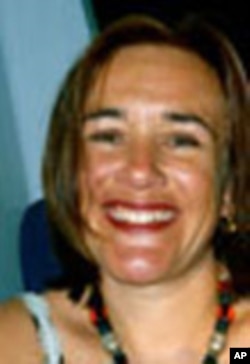The world’s largest AIDS conference is coming to the United States in 2012.
The 19th International AIDS Conference will be held in Washington, D.C. The gathering has not been held in the U.S. since 1990, when it was hosted by San Francisco. The long gap was due to government policy limiting travel to the U.S. by those infected with HIV, the virus that causes AIDS.
The International AIDS Society (IAS) says the former policy was based on “fear, rather than science. It says the change represents a significant victory for public health and human rights.”
Robin Gorna, IAS executive director, is in Washington for the announcement of the meeting being held in the U.S. capital.
“We’re delighted that the International AIDS Conference will be held in Washington, D.C., in July 2012. It’s been 22 years since we’ve been able to hold the…conference in the United States,” she says.
She’s grateful to President Obama for “taking the final steps” to lift the travel ban.
Why a U.S.-hosted conference is needed
“It’s very important to have the conference here in the United States because the U.S. has shown such tremendous leadership on HIV,” she says, “with significant research funding and also, very importantly, in being the government that has provided the most funds for scaling up the international response to AIDS.”
The effort to overturn the travel restrictions began many years ago.
“The travel restrictions were brought in in 1987 and they were supported by (Senator) Jesse Helms. And they added HIV to the travel exclusion list that was already in existence in the public health service,” she says.
Attempts to overturn them in the early 1990s failed.
“As a result of that, the International AIDS Society decided that we simply could never hold a conference here until they were overturned,” she says.
In 2006, President Bush issued a waiver allowing HIV-positive people to visit the U.S. for 60 days for business or tourism. However, Gorna says that wasn’t good enough.
“We know that these travel restrictions created untold damage to individuals and family life. But they also sent a very bad signal that discriminating against people with HIV and taking punitive measures was a good way of controlling HIV. It simply isn’t. It was bad public health, as well as an abuse of human rights,” she says.
Things began to change in mid 2008 and the announcement was made in November 2009 that the travel restrictions would be lifted on January 4.
Why not a developing country venue in 2012?
The International AIDS Conference often alternates between developed and developing nations. Next year’s meeting is set for July in Vienna. Then, two years later, it comes to the U.S. Gorna says developing countries are not being ignored.
“We certainly do want to have the International AIDS Conference in a developing country whenever possible. It has become tricky because we now attract over 25,000 people to our conferences and there are very few sites in the developing world where we can host our conference. But we’re firming committed to the 2014 conference being in a developing country,” she says.
She says it was important to seize the opportunity to hold it in the U.S. when it arose.
“We have worked with activists around the U.S. for so long to lift these travel restrictions,” she says.
A pat on the back for the U.S.
“We really want to encourage the U.S. government to maintain its significant global leadership in financing the international effort in making sure that quality research is undertaken and delivering such effective HIV responses both overseas and here,” she says.




